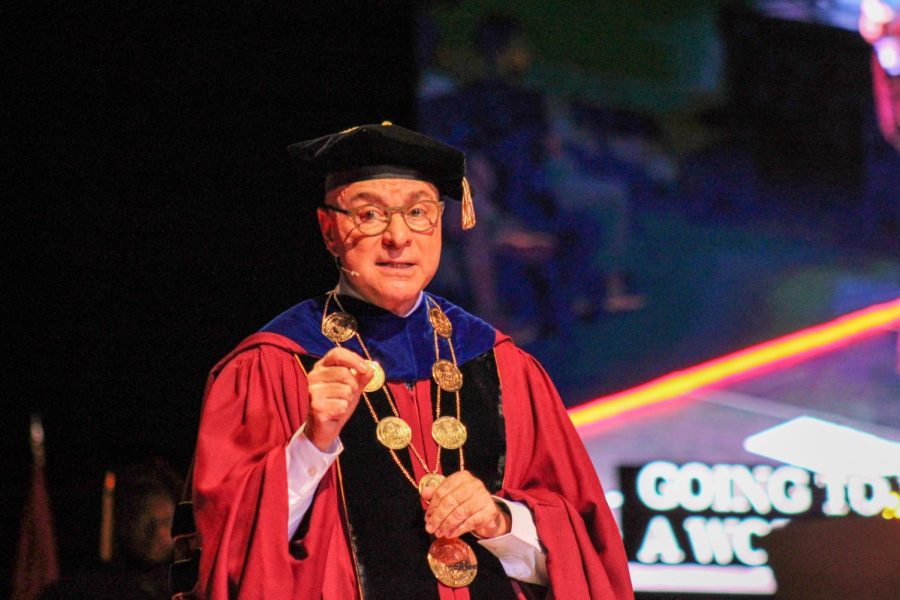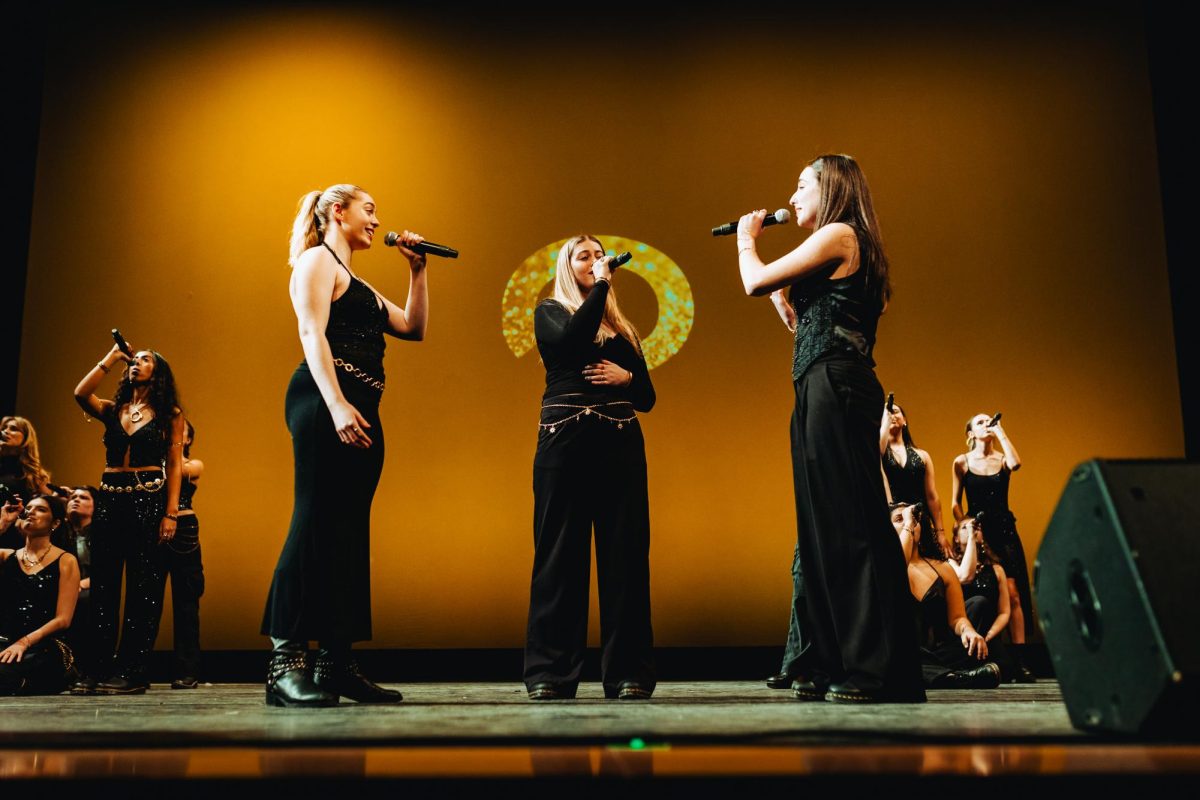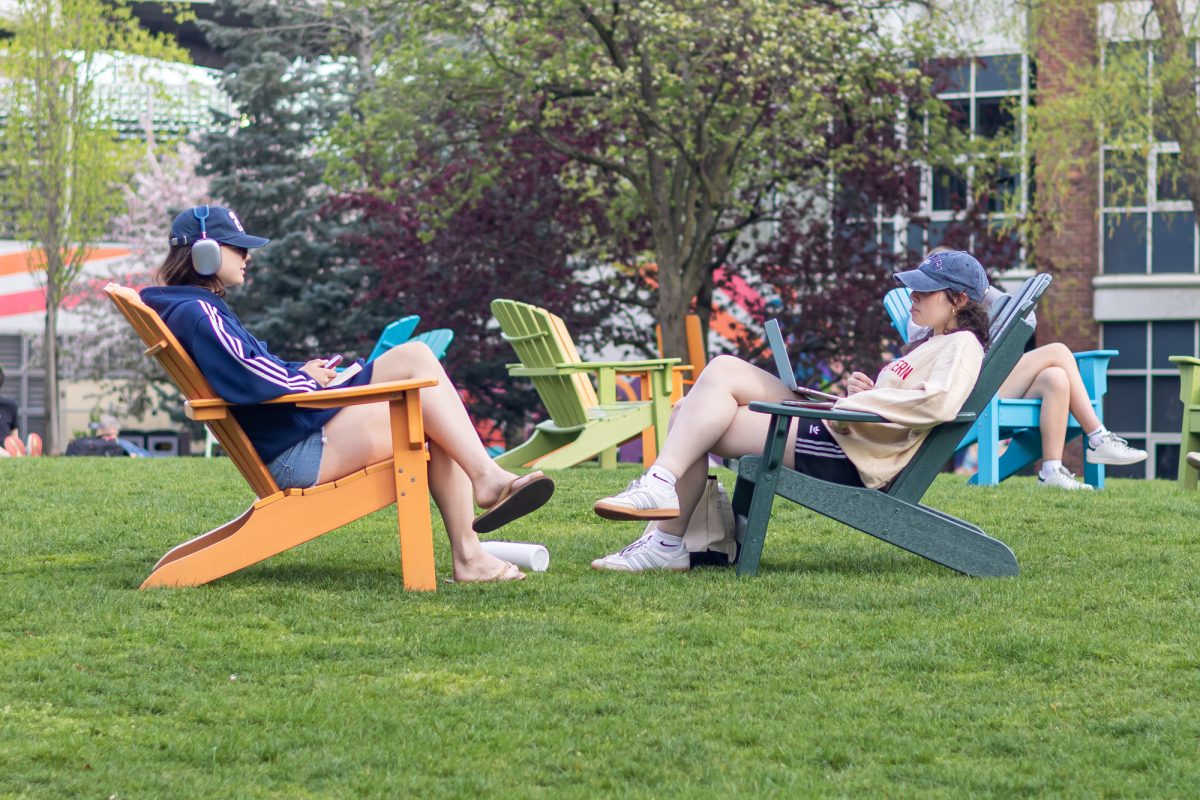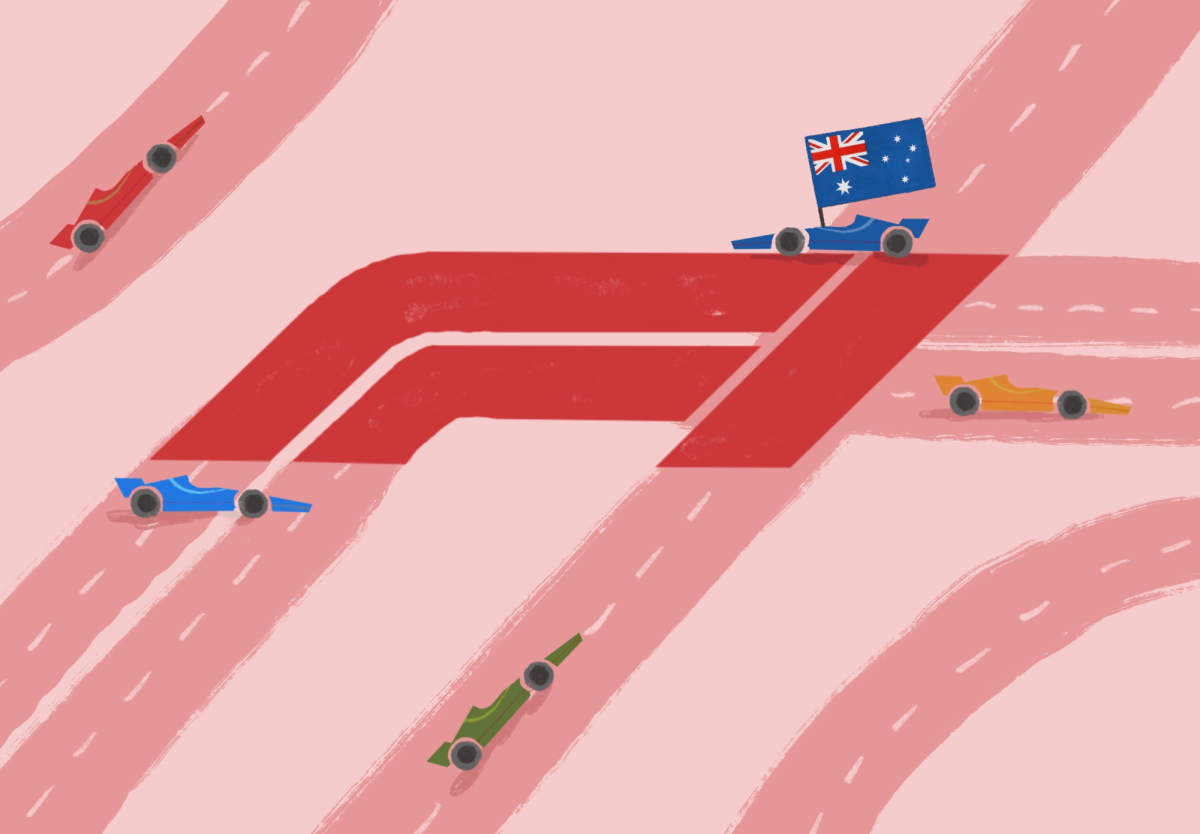Q&A: President Aoun discusses global student experience, new Miami campus
President Joseph E. Aoun speaks at Convocation Sept. 6 in Matthews Arena. In an interview with The News, Aoun said what attracts him to the Northeastern community is how engaged and innovative it is.
January 3, 2023
Northeastern President Joseph E. Aoun spoke with The News in a conversation Dec. 14 about the university’s global expansion and experiential learning programs, after the announcement of the new Miami campus.
Below is a transcript of the full conversation.
This transcript has been edited for length and clarity.
The Huntington News: We want to start with the recent news of the Miami expansion. What can we expect from that new campus, why Miami and what are you looking forward to?
President Aoun: By definition, whatever we do has to be experiential, and what is experiential? It is learning in different contexts. And that’s what we do. And so, from this perspective, our goal is to provide our students with opportunities to learn in multiple contexts.
That’s why, for instance, we have built an environment where you can be in Seattle, you can be in San Francisco, you can be at Mills, you can be in Charlotte and in Vancouver and in London, and now Portland, and now Miami. So this will provide our learners — our students — opportunities to have co-ops in different contexts and also will provide opportunities for learning. For instance, we have now a semester of entrepreneurship in San Francisco.
If you look at where we are today, we are, as far as we know, the only U.S. university that has two comprehensive campuses on the East Coast and the West Coast and at the same time we have been granted the full fledged title of university in London, which means that we can also provide our students with opportunities to have dual degrees.
If you look at it from the point of view of the undergraduate students, moving forward you have the opportunity to spend time in one of our campuses and study there, especially on the West Coast and the East Coast and in London. That gives us a differentiation that other universities are not able to offer.
Also there is something else: the fact that your degree after you leave is not going to be enough. Why? Because we all are going to become obsolete one day, one way or another, because there are new fields, new domains, new discoveries and we want to be able to reach learners and help them wherever they are. We are not going to ask them all to come to one campus. This is why we build those campuses, precisely to provide opportunities for lifelong learners — so undergraduate learners will benefit, lifelong learners will benefit and also each place has research needs, and so we would be able to work with the community, to work with the elected officials, to work with other universities precisely on solving the challenges that the places are facing.
Now you asked me, ‘Why Miami?’ Because Miami is on the move. Miami is attracting tech, is attracting health, and obviously sustainability is a big thing in Miami. With all these companies relocating, they need talent, and therefore we are going to step in and work with the partners on educating the talent.
HN: What’s the future of global campuses for Northeastern? Where are we going from here? We already have 14 campuses. What are you looking forward to next?
President Aoun: I was talking to a faculty colleague and they said, ‘What about the moon, going to the moon?’ So maybe the next campus will be there.
But meanwhile, if you look at where we are today, we are in the United States, in the UK and in Canada. Clearly, the world is not defined only by the three countries we are in. So we are looking at opportunities in Asia, for instance. So stay tuned because, at some point, you may go and have a certificate or graduate degree after you finish in Asia or maybe Latin America or maybe in Africa — we don’t know yet.
We’re constantly looking, but the whole idea is not to expand for the sake of expansion, but [the question is] would it allow us to be engaged with the communities we are in and a part of, but also to help our learners, wherever they are? We have over 300,000 alumni worldwide — so wherever you go, you will find an alumnus or an alumna. I was in Cape Town, and suddenly somebody stopped me and said, ‘Oh, we’re here because we’re doing social entrepreneurship.’ A group of students, which means our students, our learners, love to be part of different environments. That’s the essence of experiential learning.
We will keep looking at opportunities and we take our time. Usually when we enter into a new community we spend around two years meeting with city leaders, elected officials, the community leaders, the companies, the other education institutions, to try to understand whether we have a role and what role we can play because we’re going there precisely to further the environment, not only to help our learners but also to further the environment. That’s where we are, so stay tuned.
HN: With student populations all around the world, how do you see Northeastern maintaining a cohesive school identity across all those campuses?
President Aoun: That’s a great point. Ultimately, the people value tremendously the fact that they are a part of Northeastern. I value that, our students value that, our staff value that, our parents value that, our faculty value that. We had an exercise all together some years ago, and we said ‘what is the essence of a Northeastern education?’ Because precisely we are global, we want our essence to be there wherever we are. For instance, we are going to be engaged because we are an engaged institution with our communities. We are innovative, we are entrepreneurial, we are experiential by definition. And therefore, the essence that we worked on, we did it on purpose because we say wherever we are, we have to live this essence.
HN: How have your views, goals, hopes, dreams for global campuses at Northeastern changed while you’ve been here?
President Aoun: To go back to the beginning, we had various discussions on why we wanted to have two different campuses in different locations. And once again, it was part of our strategic planning exercise, and the community said: ‘Look, we are global. We are also experiential, and experiential means that we live, we study in different contexts and we impact and are impacted by different contexts.’ That’s the essence and so therefore, we cannot be restricted to one context.
Boston is a great environment, but it’s one environment. So imagine now the opportunities to be able to study and live and work in different contexts. That’s what we are providing.
We are very differentiated. We are differentiated because we have co-op, we’re very differentiated because we’re extremely global and we’re very differentiated because now we have a global university system that allows our students to be mobile and study in different contexts and different environments. The global university system is furthering our identity as a global, experiential university, but also furthering our differentiation.
HN: We’ve heard a lot about Experience Unleashed this year, how do global campuses fit into that plan?
President Aoun: If you unleash the experience, you’re going to see that there are opportunities in various contexts and variable opportunities in various cities. And therefore, what you have to do, what we have to do and what we continue to do is to try to understand the communities that we are part of, understand their needs, understand their challenges and understand their aspirations, and then play a role in, precisely, building that and working with them on that.
Let me give you an example: [in] Portland, Maine, we have the Roux Institute. When we were invited to go to Maine by Barbara and Dave Roux, the whole vision was that Maine is a great city, well positioned for the future in terms of food, in terms of tourism, but not as well positioned in terms of what shapes different industries, namely tech, AI, life sciences, etc. So they said, ‘We need a graduate school or graduate institution that will step in and help position Portland, Maine for the future.’ So we worked together and we said, ‘We will do it but in order to do it we need to have partners at the table. We need to have NGOs, we need to have companies, we need to have governmental organizations, etc. not only to help us understand what the needs are and what the aspirations are, but also to build a true partnership.’ And that’s what we did.
We have over 75 companies, NGOs, partners, even higher education partners working with us — Jackson Labs, the Maine Health System and the University of Southern Maine. So this allowed us not only to educate the talent at the graduate level, and also provide research solutions, but also we launched an ecosystem of entrepreneurship in order to incubate new companies and create startups because they’re the ones who will build the new economy.
In other words, what I’m saying is that every time we go to a place we are establishing a social [contract] with the community. To do it, you have to one, understand the community, second, earn the trust of the community by working together and third, have a mutual engagement to move that forward. Otherwise, it doesn’t work.
HN: What would you say to students who aren’t sure what the benefits of global travel are, or what they can gain from Northeastern’s position in the world?
President Aoun: There are two dimensions in what you ask: One is why is it good to have a global education, and second, how to get this global education.
Look, the world is too interesting to ignore. We are seeing now that people in the world are retrenching away from some globalization saying, ‘I want to remain confined to my geography, my environment.’ The challenges and opportunities that we face as human beings are on a worldwide level. Take the notion of the environment and sustainability; no one can work to solve the issues we face in terms of the environment on a national level only. So that’s one aspect.
The other aspect is that we are impacted by actions that we take and actions that people in other countries take, by definition. So for instance, take the notion of what happened during the pandemic. No country could say: ‘I am going to solve the pandemic for my community.’ So, we all benefited by working together — universities across the globe and companies and world health organizations to tackle that, because we didn’t know how to start. We didn’t know how to react. We built vaccines together, etc., etc. etc. If you look at sustainability and the environment, if you look at health and if you look at well-being of human beings in general, we are all interdependent. So, our students need to learn about the world because they’re going to engage with the world and the world is going to engage with them even if they don’t.
For instance, take Dialogue of Civilizations. That’s a marvelous way of getting familiar with a different environment. Co-op is another way because now you’re spending six months being there, living there, going overseas if you are [doing] Engineers Without Borders or doing social entrepreneurship, etc.
So what’s in it for the students? They understand the world, but they understand themselves. There are many things that we take for granted. Some students came back, they went to Nepal some years ago, and they had a co-op there and they showered every day in cold water because that’s what people had. That gave them an appreciation of what we take for granted. We take for granted that we have hot water, we take for granted that we have water. Essentially, what’s in it is a notion of self discovery and engagement – self discovery because you understand yourself and you understand others, and also engagement with the world in order to see where you want to be, where you want to have an impact.
English is becoming the lingua franca of the world. That means English is becoming universal, everybody is using English. So you say ‘Oh, in that case, I don’t need to understand other languages.’ But then it puts us at a slight disadvantage because the world knows English, knows our culture, knows about our TV shows, and they know about their culture, their language and their TV shows. So essentially you are in a situation and we are in a situation where the world understands us and understands themselves, and this is an opportunity for us to reciprocate. And that’s the beauty of the global system.
Global education allows you to understand yourself, understand how to engage the world and also understand how you can be impacted and impact the world. And our students are amazing with that. Global education has been on the move here. People, our students, our community want to do that. No one can say ‘look, that’s not for me because I want to stay and work in Minnesota or work in California or work in Boston,’ because even [then] we are impacted by this. We’re all interdependent and Northeastern University students are engaged — and they are engaged with the world, not only with one community but with the world. That’s beautiful.
HN: With Miami opening, what is one thing in particular you think students should take advantage of with the new campus or something they might not know about it that you think they should?
President Aoun: Miami is a hub … for the Caribbeans and also for Latin America. It’s a magnet for the people in Latin America, in the Caribbean, and just by the mere fact of being in Miami you are seeing a fusion of different cultures and different interests.
Also, Miami is a gateway to Latin America and the Caribbean. Take a look at, for instance, where we are in Boston. Boston is under-Atlantic, therefore, we tend to look at Europe and the UK and, obviously, Canada. And now that we are in Seattle, and San Francisco, and Toronto, and Vancouver, the focus and the orientation is toward the Pacific Rim. … Therefore, it’s a gateway to the Pacific Rim. … The West Coast presence allows us to engage with Asia in the same way that our presence on the East Coast allows us to be engaged with the Atlantic Rim, so that gives our students opportunities to explore the world from these vantage points.
HN: If you were starting at Northeastern as an undergrad, what experience or opportunity would you be most excited about?
President Aoun: I would come for a certain number of things. First, that Northeastern has co-op and is experiential and is the leader and the best in the world for that. I’d come to Northeastern because Northeastern allows me to do it on a global scale, that’s the second dimension.
What attracts me also about Northeastern as a student and as a member of this community is that this community is very engaged and very innovative. If you look at what our students are doing, they are constantly launching new endeavors, whether it’s Mosaic, or whether it’s Idea, or whether it’s a new club that no one has thought about, or whether it’s engagement with Engineers Without Borders, or endeavors in public health or what you are doing in terms of taking charge of The Huntington News.
Our students are very engaged and very entrepreneurial, very innovative. Why is it important for me as a student? Because learning doesn’t happen in the classroom. Learning happens because I’m looking at my colleagues, my peers and saying, ‘What can we do together?’ We have over 500 clubs, who launched these clubs?
To answer your question, in a short way: experiential, global, engaged and entrepreneurial. The global university system allows that to happen, and it’s only the beginning.
I’ll tell you something, I have two children, they’re adults now. I tell them here the students have a better education than the one you have. They don’t like it much.
HN: Northeastern has really risen up in the ranks. It’s become a much more well-respected and well-known university. Do you think that the global campuses are to blame or to credit for that rise and notability in the United States, or is it just a culmination of all the things that Northeastern is working on?
President Aoun: I think it’s a culmination of various factors. First, that we are differentiated, that we are doing it very well. We are the leaders in experiential education with co-op all over the world, the fact that we are global, the fact that we have a global system, and the best ambassadors that have been carrying that are the students … because essentially, many of the students who are applying, we ask them why did you apply and they say, ‘well we know somebody from our high school, and they are here.’
And also the fact that there were turning points. For instance, in 2008, there was a big recession and the universities retrenched. Whereas here the university decided to move forward, to double down on co-op, to make the place global, to recruit faculty and to serve the students. We’ve charted our own path, and people noticed, the same way this happened during COVID. During COVID, we were the first to open. … Many families afterwards who applied said to us, ‘We knew that if we came to Northeastern, Northeastern would not close and ask us to leave,’ and that was something important for them. People are resonating with that.
HN: One of the things we do hear a lot about at all universities, not just here, is the focus on conversations about mental health, and understanding how students can best benefit from mental health resources and how universities can address students’ needs. How do you think Northeastern can work to better support students, especially when they’re scattered across the world?
President Aoun: That’s important. For instance, I mentioned a minute ago that we [were] one of the first universities to open [following the pandemic] and we did it successfully, because essentially we wanted to make sure that every member of the community — students, faculty, staff — were here in a healthy environment.
One of the reasons was that our students said ‘isolation and staying at home is not good for us, for our mental health.’ That led us to open very early on, one of the first universities to open, precisely to mitigate the mental health crisis that is affecting us all.
Mental health is a big issue. Mental health is an issue that we face as human beings, and especially the younger generations, namely your generations. So we were very, very cognizant of that and we worked with the community, mainly with the students, to do a certain number of things. … For instance, you, the students, said we would love to have Wellness Days and we do have that. You initiated this, we worked with you to make it happen. And the community responded well — by community, namely, the students, but [also] the faculty had to learn to do it, and staff, everyone.
So first is, listen, talk. Our students are creative, entrepreneurial — wellness days [are] a direct consequence of what happens. Second, you raise an important point. If we’re global, our students have mental health needs and it’s not only in one campus, it is in all these campuses. So what we wanted to do is have accessibility worldwide. So you know about FIND, we launched FIND precisely [because] it’s not place-bound. FIND allows the students to have access to mental health engagement with professionals worldwide, 24/7. They can do it with a person in the place where they are, or they can do it [elsewhere]… How can we provide access across the whole global university system? FIND is good with that.
I said at the beginning two things: One is provide support, provide engagement and the other is [to] see whether we can also help mitigate any issue that can lead to mental health stress or crisis. So, for instance… we have … Headspace. So Headspace, that has been and is being used by our students, precisely, what is it providing? Meditation, relaxation — I use that too. We all need it, because we’re all under stress, we’re all running, we all have it.
Similarly, we have the SilverCloud platform… So if you look at all these, it has two components: one component, trying to provide a nurturing environment where we as community members support each other. And second, if there is a need, we need to provide this need and we need to help the students and you need also to help them and help each one have access to this. So that’s the idea. Are we happy? Yes. Are we satisfied? Never.
The mental health crisis is a real crisis and it’s not impacting students only. It is impacting communities … that’s why for instance, we have guidebooks that you have seen saying ‘if you see somebody who needs help, how can you help them access this help?’ In some ways, that’s the idea of being a community, supporting each other.
Stay tuned, more will happen. I just learned today that we’re working with a foundation called the JED Foundation. We’re always looking at new dimensions. Happy but not satisfied.







